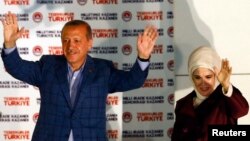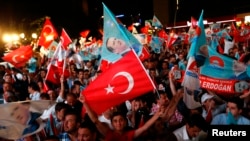Turkish Prime Minister Recep Tayyip Erdogan has won his country's first-ever direct presidential election, ensuring he will remain Turkey's leader for another five years.
Turkey's election commission Sunday said that with nearly all the votes counted, provisional results show Erdogan won an absolute majority of the vote.
The results show him easily outdistancing two opponents, Ekmeleddin Ihsanoglu, former chief of the Organization of Islamic Cooperation, garnered about 39 percent of the vote, and Kurdish candidate Selahattin Demirtas with nine percent.
Turkish television reports said the 60-year-old Erdogan, a devout Muslim, headed to a mosque to pray before an expected flight to the capital, Ankara, for a victory speech.
Erdogan is in his third term as prime minister and his election will extend his decade-long domination of Turkish political affairs.
He is viewed by supporters as responsible for Turkey's economic advance while turning the country toward religious conservatism and away from its secular traditions. The prime minister said during the campaign he would exercise the full powers of the presidency under Turkey's existing laws, including the authority to call parliament, summon Cabinet meetings and appoint prime ministers, the council of ministers and some high court judges.
In the past, Turkey's presidents have been ceremonial figureheads, but Erdogan says he intends to change the constitution and establish an executive presidency. After casting his vote Sunday, he cited the importance of the election.
"This is very important for Turkey in terms of our political history, because it's a first. As we've repeatedly said before, for the first time our people will choose their president without an intermediary. In this regard it's very, very important," said Erdogan.
Religious conservatives, who are Erdogan's core supporters, see his rise to the presidency as the crowning achievement of his drive to reshape Turkey. As prime minister, he has broken the hold of the secular elite that dominated government since the founding of the modern Turkish republic in 1923 by Mustafa Kemal Ataturk.
The prime minister's critics are disturbed by his Islamist political roots and his increasingly authoritarian bent. In the past year, Erdogan has purged thousands of police and prosecutors, increased the powers of the country’s intelligence agency and banned access to YouTube and Twitter as he fought off corruption probes that implicated the government and family members.
Erdogan's campaign slogan was "national will, national power."





